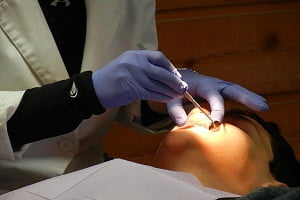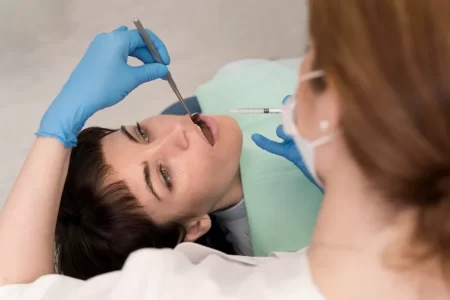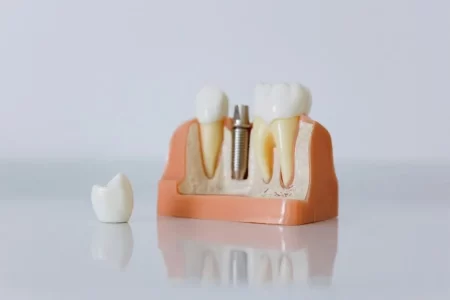Loose Wisdom Tooth Treatment in Adults: Wisdom Teeth Removal and Extraction
- Updated on: Feb 1, 2025
- 6 min Read
By
- Published on Feb 4, 2021

In the quaint town of Willow Creek, local librarian Ms. Emily Archer had always prided herself on her articulate speech, until one summer’s day, a wobbly loose wisdom tooth began to undermine her confidence. Speeches became slurs, and smiles turned timid, as the loose tooth held her daily interactions hostage. Despite her initial apprehension, a visit to the kind-hearted Dr. Reed at Willow’s Dental Haven transformed her ordeal. With the tooth gently extracted, Ms. Archer’s eloquence was restored, and her radiant smile returned to grace the bookshelves and the hearts of Willow Creek once again.
What Are Loose Wisdom Teeth in Adults
Wisdom teeth are the third set of molars that appear in adulthood usually between ages 17 and 21. The position of some wisdom teeth is such that it is difficult to clean them. So, the risk for various oral diseases is high.
One of those is a loose wisdom tooth. A loose tooth may cause other problems such as:
- Mouth pain and discomfort, especially when chewing
- Infection of the surrounding gums
- Damage to neighboring teeth due to lack of proper hygiene
- Tooth decay due to lack of brushing
Loose Wisdom Tooth Pain
Wobbly wisdom tooth is another term to explain that wisdom tooth is loose. A loose wisdom tooth can occur due to dental caries, abscesses, cyst formation, gum diseases, etc. If a wisdom tooth feels loose, it might result in pain often referred to as wisdom tooth pain which can result in teeth falling out.
Loose wisdom tooth pain can sometimes be excruciating and might lead to swelling of gums. It can also lead to stiffness in the jaw near the impacted tooth. Several treatments are recommended for wisdom tooth pain relief such as antibiotics or over-the-counter pain relievers, antiseptic mouthwash, etc. In severe cases, Medicine Hat wisdom tooth extraction is the final treatment for loose wisdom tooth pain relief.
Listed below are some commonly recommended treatment options for relief from the pain due to loose wisdom teeth.
Treatment for a Loose Wisdom Tooth
Before continuing the treatment, the dentist considers many factors to decide whether the loose tooth can be repaired.
- If the wisdom tooth is slightly loose, and it is an important part of chewing, then the dentist may recommend some measures to treat the wobbly wisdom tooth.
- If the wisdom tooth is very loose and can fall out anytime, the dentist may recommend the extraction of the wisdom tooth.
Extraction of Wisdom Tooth (Wisdom Teeth Removal)
Wisdom tooth extraction is another name for wisdom teeth removal. It is a normal procedure done on many people to help them prevent the complications of loose wisdom teeth which can cause tooth loss.
Extraction of wisdom teeth is one solution but it’s not always required. During wisdom teeth removal, your dentist or oral surgeon:
- Makes an incision in the gum to create flaps so that the tooth and bone can be exposed
- Removes any obstruction bone that may block access to the tooth
- Divide the tooth into sections so that the tooth can be easily removed
- Removes the tooth
- Cleans the area where extraction is performed
- Stitches the wound, however, it is not always required
- Control bleeding by placing gauze over the site of the removed tooth. This leads to the formation of a blood clot.
After the removal of the wisdom tooth, the missing teeth can be replaced with dentures, bridges, and implants. Read about missing teeth replacement options.
Wisdom Teeth Recovery Time for Adults
Ideally, people should recover from wisdom teeth surgery within 3 to 4 days. But in some cases, it may take longer especially if your wisdom teeth were impacted or appeared at an awkward angle. Removal of wisdom teeth by surgery leaves behind a deep wound that doesn’t heal completely for months and makes you susceptible to infections. It is therefore important that you take proper care of your teeth post-surgery. This can be done by avoiding certain activities such as these:
- Smoking
- Spitting
- Drinking from a Straw
Although the recovery from wisdom tooth surgery is gradual, people should see some improvement with each passing day. Wisdom teeth surgery sometimes causes swelling, pain, and bruising in patients, which is why they may require extra time to heal. The recovery process of wisdom teeth post-surgery can be divided into the following stages:
First 24 Hours
Blood clots may form within 24 hours after the surgery
After 2 to 3 Days
Swelling of the cheeks and mouth should start improving after two to three days of the surgery,
After 7 Days
Stitches can be removed by the dentist in this time frame.
After 7 to 10 Days
Any kind of stiffness and soreness in the jaws should go away.
After 2 Weeks
If there is any mild bruising on the face it should recover.
It is found that different people have different recovery times depending upon the patient’s post-surgery response. The wisdom teeth recovery time for some adults is much longer than usual due to many reasons like if the blood clots dislocate from the wound, or the wound gets infected.
How to Speed up Wisdom Teeth Recovery Time for Adults
Formation of blood clots at the place where the tooth was extracted post wisdom teeth surgery is an important part of the healing process because of the following reasons:
- They prevent too much blood loss
- They protect the wound against various infections
- They allow the growth of new tissues
- They protect the exposed bone
Post wisdom teeth surgery, it is important that we avoid dislodging these blood clots, especially within the first 24 hours. Therefore we should avoid:
- Brushing teeth near the extraction site
- Rinsing the mouth vigorously, especially within the first 24 hours. After this, one can use an antiseptic mouth rinse
- Hot drinks
- Eating foods that require excessive chewing
- Avoiding sucking on straws, smoking, or drinking alcohol for at least 24 hours
Why Is Wisdom Tooth Extracted? What Are the Reasons for Wisdom Tooth Extraction?
Wisdom teeth need to be extracted in people who have loose wisdom teeth, or the teeth are badly damaged and cannot be repaired. Wisdom teeth are extracted under local anesthesia, and the pain subsides within a week.
Following are some of the main reasons behind wisdom tooth extraction:
Pericoronitis
Pericoronitis is a condition characterized by inflammation of the tissues that surround the partially erupted teeth. Most pericoronitis is found in lower wisdom teeth, and it usually affects young individuals. Since wisdom teeth don’t play any role in bite, they are extracted if affected by pericoronitis. The symptoms associated with this condition include:
- Swollen gums around the wisdom teeth
- Pain in the mouth
- Bad taste in the mouth
Some serious symptoms may also occur and need immediate medical intervention. These include:
- Abscess in the wisdom teeth
- Difficulty in opening the mouth
- Extreme pain in the mouth
Caries, Pulpitis, and Tooth Root Infection
Carries and dental decays are common with wisdom teeth, however, if left untreated, they may lead to inflammation of the dental pulp called pulpitis. Symptoms like tooth throbbing often characterize pulpitis. If not treated immediately, it reaches the tooth root and causes apical periodontitis, which is the main reason for wisdom teeth extraction.
Periodontitis
Periodontitis is a condition in which the bones and tissues supporting the teeth get damaged. Under such conditions, it is important to extract the affected teeth or replace them with a prosthesis.
Tooth Trauma, Dental Fractures, and Tooth Injury
Severe trauma to teeth, dental fractures, and severe tooth injury are major reasons for extracting wisdom teeth in most cases.
Non-Extraction Approaches
If the loose wisdom teeth are in a position that can be treated easily and eventually can be managed, then the wisdom teeth removal procedure can be avoided.
The following measures can be taken to fix the tooth.
Bone Grafting
If the wisdom tooth has become loose due to bone deterioration, the doctor suggests bone grafting. In this method, the fragments of bone are taken from another area of the patient’s body, or a special bone grafting material is used to repair diseased bone. It supports the teeth and tightens them.
Splinting
In a splinting procedure, a piece of metal is used to bond two neighboring teeth. This gives the loose tooth extra support and keeps it tightened.
For wisdom teeth, intra-coronal splints are used. In this, a small channel is cut into the teeth and a rigid custom-formed metal splint is inserted into the channel. Finally, the teeth are bonded or cemented to stabilize the teeth.
Intra-coronal metal bar splint is designed in such a way that they can be used to stabilize loose back teeth (premolars and molars) where biting forces are greater.
Mouthguard
Mouth guard creates a protective barrier between the upper and lower teeth and thus prevents teeth grinding which is also the main reason for loose teeth.
Keeping Wisdom Teeth Healthy
Some measures can be adopted to keep the wisdom teeth healthy. These measures include:
- Good oral hygiene including better brushing and flossing
- Use an electric toothbrush in your cleaning routine for effective cleaning, if possible
- More frequent or extensive dental cleanings (scaling and root planing)
- Gum surgery to improve the tooth-gum relationship which enhances adequate cleaning












